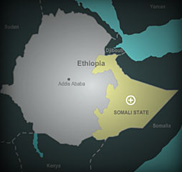 Ethiopia's government has committed extensive war crimes and crimes against humanity during a brutal counterinsurgency campaign in the remote Ogaden region, a report says today.
Ethiopia's government has committed extensive war crimes and crimes against humanity during a brutal counterinsurgency campaign in the remote Ogaden region, a report says today.
Human Rights Watch accuses the Ethiopian military of extrajudicial killings, rape, torture, forcibly displacing thousands of civilians and using food as a weapon of war in its attempts over the past year to defeat the Ogaden National Liberation Front, which claims to seek self-determination for the eastern region.
Satellite images published in the 130-page report show how villages have been burnt down to deny the rebels a support base - a tactic more often associated with the Darfur region of neighbouring Sudan.
The watchdog accuses the US, UK and other EU countries, who give Ethiopia £1bn a year in aid, of ignoring the abuses, thereby increasing the risk of further "devastation, famine and impoverishment in a region that already knows these trends too well".
"We don't like to rank abuses in different parts of the world, but what is happening in the Ogaden is up there with the worst," said Georgette Gagnon, Africa director at Human Rights Watch. "We are talking about village elders being strangled, and women raped until the point of unconsciousness. And it is being done with complete impunity, and with a blind eye from the international community."
A small-scale rebellion in the Ogaden region, populated mainly by ethnic Somalis, had been simmering for decades before the ONLF attacked an oil installation in April last year. More than 70 Chinese and Ethiopian workers were killed.
The government responded with a massive military crackdown. Civilians in the region were forced to join local militias to help fight the ONLF. While denying that any abuses were taking place - a stance Prime Minister Meles Zenawi still maintains - the government took steps to ensure that no outsiders could witness what was going on.
Several aid groups were expelled, including the International Committee for the Red Cross, while journalists were denied permission to visit the five main conflict areas - Fiiq, Wardheer, Dhagahbur, Gode and Korahe.
Human Rights Watch researchers were not allowed in the Ogaden region, but conducted more than 100 interviews over several months with victims or witnesses from the Ogaden who had fled to Somalia or Kenya.
The worst of the abuses appear to have taken place between June and September last year, although cases of arbitrary detention and severe restrictions on trade and movement are ongoing.
Civilians were given between two and seven days' notice to leave small villages and settlements for designated towns. "To secure compliance with the evacuation orders, the Ethiopian army repeatedly implemented a phased system of terror involving the confiscation and killing of livestock, public executions, and the destruction of villages by burning," according to the report, entitled Collective Punishment.
Human Rights Watch says it received accounts of 87 villages or nomadic settlements burnt or forcibly evacuated in the year to August 2007, but believes the real number is far higher. Before-and-after satellite photos show four villages - Dameerey, Laasoole, Qamuude and Labiga - almost destroyed by fire.
Researchers also documented the execution of more than 150 individuals, many of them in "demonstration killings", as well as multiple reports of rape of women who had been detained at military barracks or had been found looking for firewood or food in "closed" zones.
A 22-year-old female refugee who escaped to Kenya told what had happened to her and other women detained near a nomadic settlement outside Shilabo town by an army patrol.
"They beat me very hard until I fell to the ground. This time while lying on the ground I was raped. I don't know how many men raped me. Other women were raped too," she said.
The ONLF, which claimed this week to have launched a major military offensive against government forces, is also accused in the report of "serious violations of international law", including the indiscriminate use of landmines and execution of suspect government collaborators.
Human Rights Watch criticises the UK, which gives £130m in aid annually to Ethiopia, for its muted response over the Ogaden conflict, noting that only one paragraph in the latest Foreign & Commonwealth Office human rights report dealt with the crisis, and that it singled out abuses by "terrorist groups operating in this region".
The most severe criticism is reserved for the US, which is the biggest donor and regards Ethiopia as a key ally in the "war on terror". Having backed Ethiopia's incursion into neighbouring Somalia, which the US regards as a potential terrorist haven, Washington has "minimised and possibly actively ignored internal concerns and reporting on the situation" in the Ogaden.